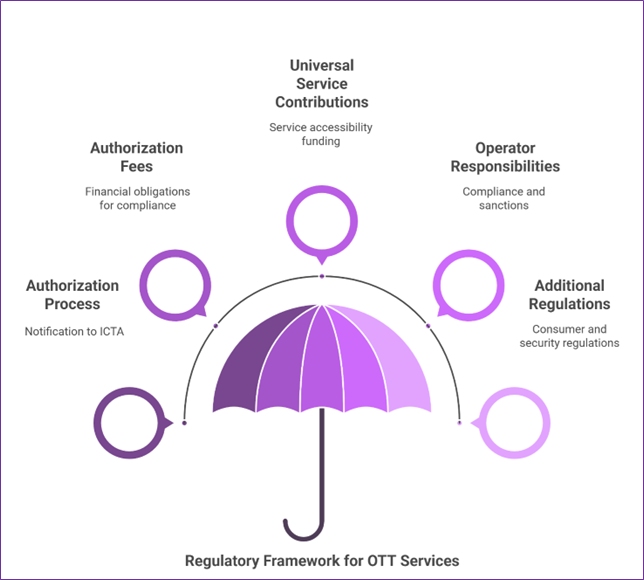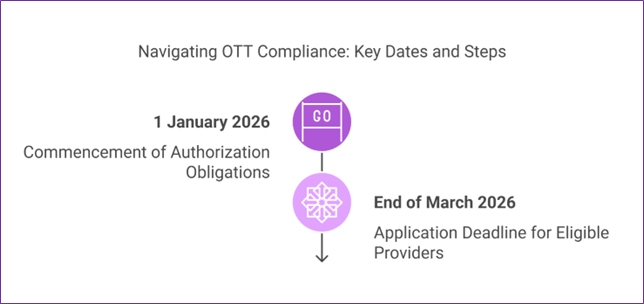- within Media, Telecoms, IT and Entertainment topic(s)
- in United Kingdom
- within Intellectual Property, International Law and Tax topic(s)
- with readers working within the Aerospace & Defence, Media & Information and Metals & Mining industries
With the decision of the Information and Communication Technologies Authority ("ICTA") dated 7 March 20251, Türkiye has taken another major step toward regulating the over-the-top ("OTT") communications services landscape. The ICTA has published three drafts for public consultation, all of which aim to provide much-needed clarity on the authorization of OTT communications services in Türkiye.
This move represents a continuation of the regulatory shift that began with the 2022 amendments to the Electronic Communications Act, which formally recognized OTT services as part of the regulatory framework. However, the latest draft regulations now flesh out what this recognition means in practice, raising both compliance obligations and strategic considerations for global and domestic service providers alike.
What's on the Table?
The following three draft texts have been published on the ICTA's website on 21 March 2025 for a 30-day public consultation period:
- Draft Regulation Amending the Authorization Regulation for the Electronic Communications Sector
- Draft Regulation Supplementing the Regulation on the Definition, Scope and Duration of Electronic Communication Services, Networks and Infrastructures
- Draft Notification Form
These documents together introduce a comprehensive authorization framework for OTT services and clarify the scope of regulatory oversight that the ICTA intends to assert.
Defining the OTT Service
The concept of "over-the-top service" was first codified in Turkish law through the amendment of the Electronic Communications Act on 13 October 2022. The draft regulation reiterates and builds on this definition, stating that OTT services are:
"Interpersonal electronic communication services within the scope of audio, written and visual communication provided to subscribers and users with internet access through a publicly available software independent from the operators or the internet service provided."
This means that any communication tool (messaging, voice, or video) that functions independently of traditional telecom providers and operates via the internet may fall within this scope. The emphasis on independence from operators is particularly relevant, as it targets services such as messaging apps, VoIP platforms, and certain video conferencing tools.
Authorization: Not New, But Now Clearer
While the idea of subjecting OTT services to authorization is not new (as it was already introduced in the 2022 legal amendments however, until this secondary regulation, the procedures and principles were not defined; therefore, there was no authorization requirement), the draft regulations provide much-needed detail regarding how this will work in practice. OTT service providers will be subject to:
- An authorization process via notification to the ICTA
- Authorization fees
- Obligations related to universal service contributions
- Compliance with existing operator responsibilities, including administrative sanctions and potential suspension of operations
- Additional ICTA-imposed regulations, such as those relating to consumer protection, competition and market structure, network and information security, personal data protection, interoperability, sectoral reporting and security incident notifications, national security and public order concerns
In short, OTT services are being brought closer to regulatory parity with traditional telecom operators, at least in terms of formal obligations.

Exceptions and Thresholds
There are, however, notable exceptions to the authorization requirement. These include:
- Services below a deduplicated monthly access/user threshold (determined by the ICTA)
- Services where interpersonal communication is not considered essential to the functionality of the application
The draft supplementary regulation sets the access/user threshold at 1,000,000 monthly deduplicated users. This threshold introduces a clear dividing line between small-scale or niche platforms and mass-market services.
As for what constitutes a service where interpersonal communication is not "essential," the ICTA has not yet issued guidance. However, although it remains unclear how the BTK will evaluate it, it is reasonable to assume that features such as in-game chat tools or secondary messaging functions in non-communication-centric apps may fall under this exception.
A Broader Toolset for the ICTA
Even beyond the authorization regime, the ICTA is equipping itself with strong discretionary powers. According to the draft, the ICTA may block access to OTT services, whether authorized or not, where national security, public order, public health, or other public interest concerns are at stake.
This adds another layer of risk for OTT providers, particularly those offering encrypted or anonymous communication services, which are often subject to scrutiny in multiple jurisdictions.
Compliance Timeline and Application Process
The proposed timeline for compliance is as follows:
- Authorization obligations will commence after 1 January 2026
- OTT service providers with monthly deduplicated users of 1 million or more, operating without authorization by 31 December 2025, must apply for authorization by the end of March 2026
- Applications are to be made via the updated Notification Form, which includes a dedicated section for OTT services and requires full documentation of compliance with the ICTA's requirements
This gives affected service providers roughly a one-year window to assess their user base, determine whether they meet the threshold, and prepare for the application process.

Enforcement and Sanctions
The draft regulations introduce strict enforcement mechanisms for non-compliance:
- OTT providers operating without authorization face administrative fines ranging from 1 million to 30 million Turkish Liras (approximately USD 26,000 to USD 790,000)
- Failure to pay these fines and to apply for authorization within six months of ICTA notification may result in bandwidth throttling of up to 95%
- If, after an additional three months, the provider remains unauthorized, the ICTA may order a full access ban on the relevant app or website
In addition, services subject to access bans may also face supplementary measures under Article 22 of the Electronic Communications Act and will be barred from reapplying for authorization for three years.
Final Thoughts
The ICTA's latest initiative marks a significant development in Türkiye's evolving regulatory stance toward OTT services. By aligning OTT services with traditional telecoms in terms of oversight, the ICTA aims to create a level playing field and ensure consistency in consumer protection, national security, and market regulation.
For global OTT providers, these developments underscore the importance of proactive compliance planning. Identifying whether a service exceeds the user threshold, assessing whether interpersonal communication is central to the offering, and preparing for potential authorization requirements should now be top priorities.
While the public consultation period is still ongoing, affected stakeholders should seize this opportunity to engage with the ICTA and contribute to shaping the final version of the regulations. The next twelve months will be pivotal.
Footnote
1. https://www.btk.gov.tr/kurul-kararlari?decision_no=2025%2F%C4%B0K-YED%2F70
The content of this article is intended to provide a general guide to the subject matter. Specialist advice should be sought about your specific circumstances.



